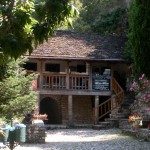The Beautiful City of Ioannina
By Helen Grubner. Filed in Uncategorized |Ioannina is a beautiful city in north western Greece, with traditions and a history going back centuries. Following a good night’s sleep on my first night at Matsa Pension, I was out and about early yesterday morning for a walk beside Lake Pamvotis – taking the first of 90 images that I would clock up for the day. On my return I answered the doorbell to a Dutch lady and her daughter who decided to take a room for the night so I was no longer alone there.
Ventured out once again for a walk around the beautiful area of the old castle of Ioannina, a bizarre, maze like layout of the castle’s streets which were allegedly designed to confuse pirates. They certainly confused me and more than once I lost my way completely. By 1400 hours I found myself on one of the small motor boats which run every half hour in summer to the islet of Nisaki – the little island on Lake Pamvotis. Earlier in the day when I had asked an old man I saw fishing by the lake, did he eat the fish he caught, he said no, he gives them to a church priest. When one arrives on the little island, immediately you see three water tanks stationed at a lakeside taverna, one containing live eels, another small freshwater crayfish of some kind and the third, large carp like fish and goldfish. My point being, in view of the lake being a mass of algae green waters, I personally would not want to risk eating fish which may have come from there. Instead I chose to eat lamb at a lakeside taverna and even that was not so good. In Greece, when you need to use a knife instead of just your fork in one hand and a chunk of bread in the other as I did, it usually means the meat is a little tough. I fed bread to the sparrows and one lucky cat enjoyed all the bits remaining on my plate.
After lunch I took a walk around part of the island and of the six monasteries there, I visited only one – The Monastery of St. Nicholas (Spanou) or Philanthropinon from 1292. A very tiny little Greek lady somewhat reluctantly unlocked the door for me. I do not think she could be bothered with visitors in the heat of the day, however, it was well worth seeing, the first chapel I can recall viewing with unrestored frescoes and they were in exceptionally good order. I also passed by the Cells of St. Panteleimon Monastery where Ali Pasha found shelter and was put to death in 1822 – that building has now been converted into a Museum. With mainly slate roofed houses, souvenir and silverware shops, tavernas and cafes, the island is a very picturesque place to visit.
I returned to the city on the 1630 hours motor boat, then somehow managed to lose my way again in the old castle area of the town. Earlier in the morning I had asked my hostess if she could find out what time the bus left today (Wednesday) for Monodendri, one of the 46 mountain villages which make up the Zagorohoria, where I had pre-booked accommodation via email at Archontiko Zarkada, a traditional guest house. At 1900 hours, she informed me there was no bus to Monodendri until Friday but I wanted to come here today. I would find a way, however, you will have to wait until I publish my next blog to read how I managed it.
Footnote: For those of you who liked the sound of Anna’s Fig Bread, check out her comment on my last blog ‘Limnos, Agios Efstratios and Journey to Ioannina’. There you will find the recipe for Ann’s Almond-Fig Bread. Anna uses dried figs but I do not think they need necessarily be of the black mission variety. Also, the Limnos flour is something special and bread made from it is quite yellow in colour, however, again this should not matter.



